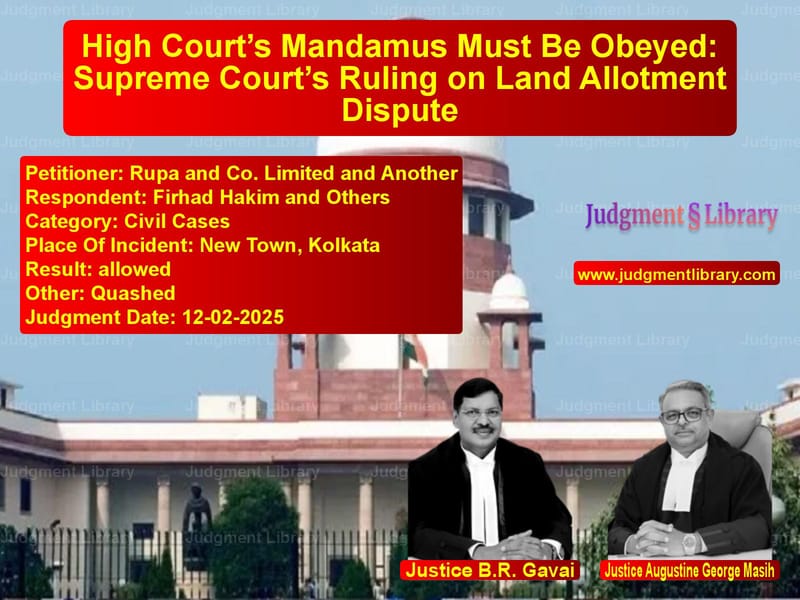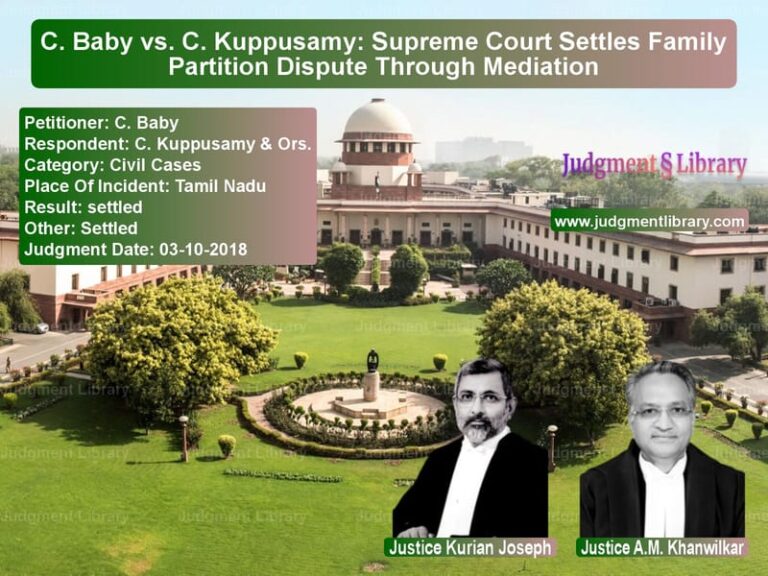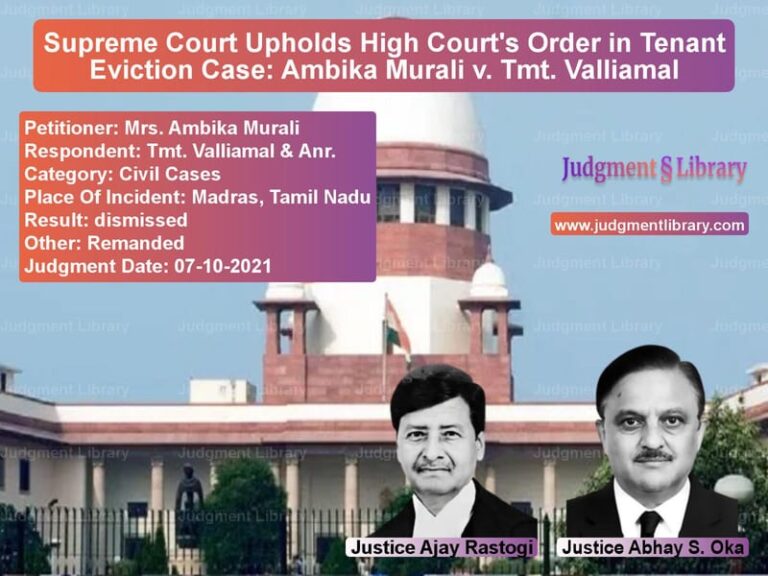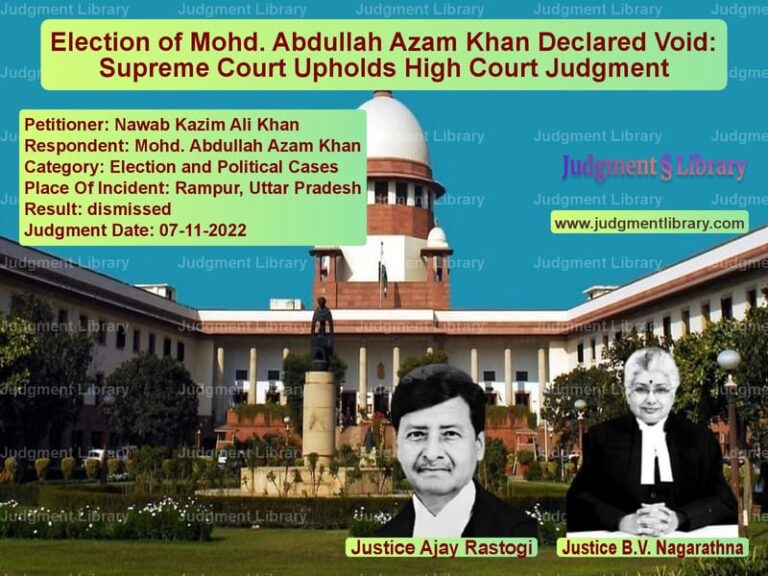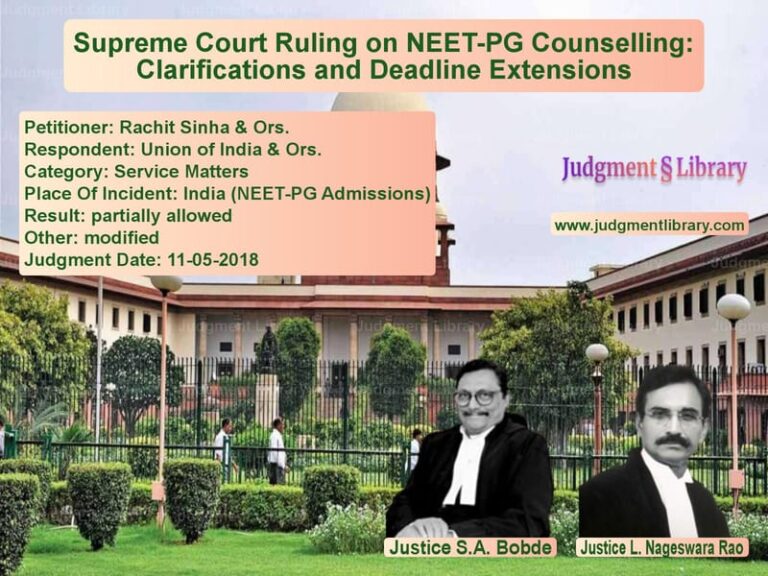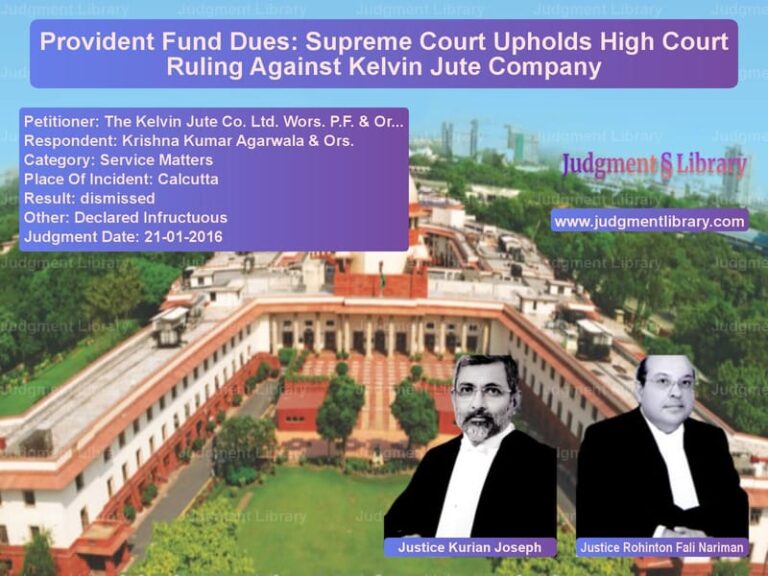High Court’s Mandamus Must Be Obeyed: Supreme Court’s Ruling on Land Allotment Dispute
The Supreme Court of India recently delivered a significant judgment in the case of Rupa and Co. Limited and Another vs. Firhad Hakim and Others, which revolved around the non-compliance of a High Court-issued writ of mandamus by state authorities. The case highlights the importance of maintaining the dignity and authority of the judiciary and ensuring that government agencies abide by court orders in letter and spirit.
This appeal arose from the refusal of the West Bengal government and the West Bengal Housing Infrastructure Development Corporation Limited (HIDCO) to comply with the Calcutta High Court’s ruling, which had directed them to execute a sale deed in favor of the appellants. Despite the High Court’s clear mandate, the government attempted to impose new conditions and sought mediation, prompting the appellants to approach the Supreme Court for relief.
Background of the Case
The case dates back to 2011, when HIDCO offered to sell a piece of land to the appellants, Rupa and Co. Limited, on a freehold basis in New Town, Kolkata. The agreed sale price was ₹4,00,92,000, of which the appellants duly paid the entire amount. However, in 2012, HIDCO unilaterally changed the terms, stating that the land would now be leased for 99 years instead of being transferred as freehold property.
The appellants challenged this decision, arguing that the change was arbitrary and unreasonable. The case went through multiple legal battles, and eventually, the Division Bench of the Calcutta High Court ruled in their favor on February 10, 2020, directing HIDCO to execute and register the sale deed.
Despite this ruling, HIDCO and the West Bengal government failed to comply, leading to contempt petitions being filed before the High Court. In a surprising turn, the High Court, instead of enforcing its previous orders, referred the matter for mediation on February 9, 2024. This decision was challenged before the Supreme Court.
Arguments by the Parties
Petitioner’s Arguments
The learned counsel for the appellants contended:
- The High Court had already issued a clear writ of mandamus, which should be obeyed in letter and spirit.
- The government’s demand for a higher price at the current market rate was an attempt to circumvent the High Court’s order.
- The respondents had committed aggravated contempt by failing to execute the sale deed despite multiple directives from the courts.
- The High Court’s decision to refer the matter to mediation was legally untenable, as mediation cannot be imposed without both parties’ consent.
- The delay of over 12 years had caused significant financial and legal hardship to the appellants, and they should not be forced to undergo further delays.
Respondent’s Arguments
The respondents, including HIDCO and the West Bengal government, argued:
- The government was willing to abide by the High Court’s orders but sought to balance equities by requiring the appellants to pay the current market price.
- HIDCO officials could not execute the sale deed without explicit permission from the state government.
- The state government was taking steps to comply with the court’s directions, but the process required approval from higher authorities.
- Mediation was a reasonable step to resolve the dispute amicably and ensure a fair outcome.
Supreme Court’s Observations
The Supreme Court took a firm stance on the matter, emphasizing the importance of judicial authority and adherence to court orders. The Court noted:
“The High Court itself, on more than one occasion in the contempt proceedings, found that the state was bound to comply with the writ of mandamus. It could not have referred the matter for mediation when the respondents had already been directed to execute the sale deed.”
“Under the constitutional scheme, a writ issued by the High Court in exercise of its jurisdiction under Article 226 of the Constitution of India must be followed in letter and spirit by all authorities bound by it.”
“Asking the appellants to pay according to the current market rate after they have succeeded before both the High Court and this Court is an attempt to disobey and defeat the High Court’s mandamus.”
Final Judgment
The Supreme Court allowed the appeal, setting aside the High Court’s order that had referred the case for mediation. The Court held:
- The respondents must execute and register the sale deed as per the High Court’s order dated February 10, 2020.
- The government’s demand for a revised market price was legally unsustainable.
- If the sale deed is not executed by the next hearing date, the Chief Secretary of West Bengal must personally appear before the Supreme Court to explain why contempt proceedings should not be initiated.
The Court further directed that if the High Court’s order is complied with before the next hearing, the Chief Secretary need not appear.
Conclusion
This judgment reinforces the principle that government authorities must strictly adhere to court orders, especially when they are upheld at the highest judicial levels. The Supreme Court’s firm stance ensures that the dignity of the judiciary is maintained and that no entity, including the state, can disregard binding court decisions.
Petitioner Name: Rupa and Co. Limited and Another.Respondent Name: Firhad Hakim and Others.Judgment By: Justice B.R. Gavai, Justice Augustine George Masih.Place Of Incident: New Town, Kolkata.Judgment Date: 12-02-2025.
Don’t miss out on the full details! Download the complete judgment in PDF format below and gain valuable insights instantly!
Download Judgment: rupa-and-co.-limited-vs-firhad-hakim-and-oth-supreme-court-of-india-judgment-dated-12-02-2025.pdf
Directly Download Judgment: Directly download this Judgment
See all petitions in Property Disputes
See all petitions in Specific Performance
See all petitions in Contract Disputes
See all petitions in Contempt Of Court cases
See all petitions in Judgment by B R Gavai
See all petitions in Judgment by Augustine George Masih
See all petitions in allowed
See all petitions in Quashed
See all petitions in supreme court of India judgments February 2025
See all petitions in 2025 judgments
See all posts in Civil Cases Category
See all allowed petitions in Civil Cases Category
See all Dismissed petitions in Civil Cases Category
See all partially allowed petitions in Civil Cases Category

